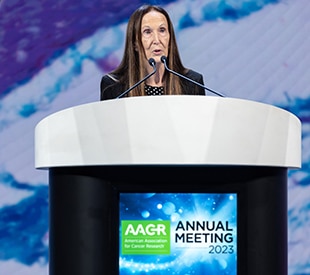A New Era in Targeting KRAS
Researchers discuss recent progress in targeting a so-called “undruggable” protein at American Association for Cancer Research meetings.
In 1982, dubbed “The Year of the Oncogene” by Nature, Mariano Barbacid, PhD, FAACR, and others identified and isolated a family of cancer-causing genes from human cells for the first time—first HRAS, then KRAS.
Fast forward to March 2023, when Dr. Barbacid opened the AACR Special Conference: Targeting RAS by commemorating the 10th anniversary of a seminal 2013 paper by Kevan Shokat, PhD, FAACR, that refuted KRAS’s status as an “undruggable” protein. Dr. Shokat discussed this research in an interview with AACR Stories.
As a result of Dr. Shokat’s research, Dr. Barbacid explained, two direct inhibitors of the KRASG12C mutant protein are now approved to treat patients with lung cancer, illustrating the immense progress made in the 40-plus years since The Year of the Oncogene.

Dr. Barbacid then turned his attention to the future, asking, “What’s next?”
He predicted that the future of treating KRAS-mutated cancers would involve targeting additional KRAS mutants, either directly through the development of new inhibitors against these other mutations, such as those common in pancreatic cancers, or indirectly by blocking the downstream cancer-promoting effects that are activated by KRAS mutants.
“This is not the end of the story,” he contended. “I think that a new era in KRAS, in targeting KRAS, is in front of us.”
Fellow KRAS researchers Frank McCormick, PhD, FAACR, and an AACR Past President; and Dafna Bar-Sagi, PhD, FAACR, averred that a chief priority for the field is understanding and overcoming treatment resistance, which is common among patients treated with KRAS inhibitors. They suggested that targeting signaling downstream of KRAS or harnessing the immune system might be effective approaches to prevent or circumvent resistance.

“RAS has a very profound effect on the immune microenvironment,” said Dr. Bar-Sagi, adding that future efforts to target KRAS and overcome resistance should account for these effects.
As researchers continue to address key questions, such as how to design inhibitors against different KRAS mutants and how to improve treatment responses, collaboration will be key, noted AACR Past President David A. Tuveson, MD, PhD, FAACR.
“I’m really pleased to see … biopharma collaborating with academia to ask these questions because it will be essential to getting to the next level of combinations,” he said.
At the Targeting RAS conference, Rising Star Andrew Aguirre, MD, PhD, agreed. “It is incumbent on all of us to work together … to work with pharmaceutical companies to develop appropriate trials, to share data early and often.”
AACR’s array of scientific conferences provides important avenues for researchers to form collaborations and share progress in their research. The first plenary session of the AACR Annual Meeting 2023, “Beating KRAS: A 30-year Overnight Sensation,” highlights progress in targeting cancers driven by mutations in KRAS.
Visit the official AACR blog, Cancer Research Catalyst, for an overview of research presented at recent AACR conferences:
- Beating KRAS highlights the first plenary session of the AACR Annual Meeting 2023.
- Driving Progress Against RAS-driven Cancers summarizes research presented by Drs. Barbacid, Aguirre, and Tuveson during the AACR Special Conference: Targeting RAS.
- KRAS, A History outlines key advances from the past four decades of KRAS research, which were discussed at the AACR Annual Meeting 2022.

